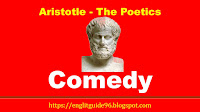Aristotle
- The Poetics
Value of His Criticism
While Plato’s approach to literature was that
of a social reformer, Aristotle’s is that of a scientist. Plato wanted
literature to do the works of morality; Aristotle expects it to be no more than
what it is –an art. Aristotle clearly sees the distinctions between the two
which Plato had failed to see. ‘The standard of correctness’, he says, ‘is not
the same in poetry and politics, any more than in poetry and any other art’.
While politics, which is a social science, is to be judged by the contribution
it makes to social well-being, poetry is to be judged by its proper function-
pleasure. To do this it has to make an appeal to the emotions, which is catharsis
and not harmful in its effect as Plato believed. Aristotle discovers the
principles by which literature can most effectively discharge this function: it
has unity of action, which Plato stressed too, and propriety or decorum in all
its parts-characters, thought, style and performance. In this way he judges
literature by its own standards- the aesthetic. In tracing the origin and
development of the three art forms, he shows himself a master of the historical
method.
The
fundamental thought of Aristotle’s philosophy is Becoming not Being and
Becoming to him meant not an appearing and a vanishing away. The concrete
individual thing is not a shadowy appearance but the primary reality. The
outward world and material world, the diverse manifestations of nature’s life,
organic and inorganic, the processes of birth and decay, the manifold forms of
sensuous beauty, all gained a new importance of his philosophy. Physical
science, slighted by Plato was passionately studied by Aristotle. The work of
art was not a semblance opposed to reality, but the image of a reality, through
which the idea shows more apparent than in the actual world. Aristotle saw in
fine art a rational faculty. The illustrations which fine art employs do not
cheat the mind; they image forth the idea which cannot find adequate expression
under the forms of material existence.






















0 Comments